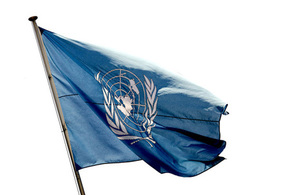UNGA 73 First Committee: UK Statement on Regional Disarmament and Security
The UK highlighted the close link between regional and global security, while condemning recent actions taken by the Assad regime, the DPRK, Russia and Iran.

UN Flag
The UK aligns itself with the statement delivered by the European Union. I would like to make some remarks in a national capacity.
Regional stability is key to our pursuit of global security, prosperity and peace. It requires understanding and respect between neighbours committed to common rules of behaviour. Unfortunately, we continue to see evidence that certain countries and groups are determined to erode previously accepted norms. The use of chemical weapons, for example, threatens to undermine international efforts to consign these heinous weapons to history, with clear implications for regional security.
It is in this context that the UK remains fully committed to a zone free of weapons of mass destruction and their delivery systems in the Middle East. As a Co-Convenor, we have made efforts to further progress on this issue by meeting the Arab League Wise Person Panel and sponsoring a workshop to which all states from the region were invited. We will consider all suggestions for a way forward but the process must be inclusive to be effective. We are concerned that the proposal currently before this Committee does not meet this requirement.
We should remember that the 1995 Resolution on the Middle East covers a zone free of all weapons of mass destruction, not just nuclear weapons. In Syria, the independent OPCW-UN Joint Investigative Mechanism has concluded that the Assad regime had repeatedly used chemical weapons against its own people, in defiance of its obligations under the Chemical Weapons Convention. To make meaningful progress on the zone, countries in the region must have confidence that others will abide by the terms of the agreement. We continue to call on the Assad regime to fully declare and destroy all aspects of their past and current chemical weapons programme.
The decision to strengthen the OPCW at the Fourth Special Conference of States Parties to the Chemical Weapons Convention gives some cause for hope but we must not be complacent. We now need to work together to support the Director-General to implement the decision in full.
Preventing the proliferation of nuclear weapons is another requirement for regional stability. The Joint Comprehensive Plan of Action remains an invaluable agreement in this regard. We welcome confirmation by the IAEA that Iran continues to fulfil its nuclear-related commitments and urge Iran to continue its compliance. The UK is committed to working with the remaining parties to the agreement to preserve its economic benefit for Iran.
At the same time, we have deep concerns about Iran’s damaging regional activity, including their support to militant non-state actors. Additionally, Iran’s continued development of ballistic missiles destabilises the Middle East and is inconsistent with UNSCR 2231.
The DPRK’s illegal pursuit of nuclear weapons poses a serious threat to regional security. We welcome the ongoing discussions between the US and the DPRK. It is now vital that the DPRK takes concrete steps towards implementing complete, verifiable and irreversible denuclearisation. Until the DPRK commits to this process, the international community must continue to strictly enforce existing sanctions.
Mr Chairman,
We and our NATO Allies have raised serious concerns about Russian compliance with the Intermediate-Range Nuclear Forces Treaty. Russia has refused to engage constructively in dialogue and has offered no credible response. We want this treaty to continue to stand but that requires both parties to be compliant. We continue to call on Russia to demonstrate full and verifiable compliance with the Treaty.
Disarmament is only possible when there is trust between all parties. There is an urgent need for confidence-building measures and a renewed effort to restore this trust. Alongside effective attribution and non-proliferation regimes, this will reinforce the rules-based international system that is essential for the security of us all.